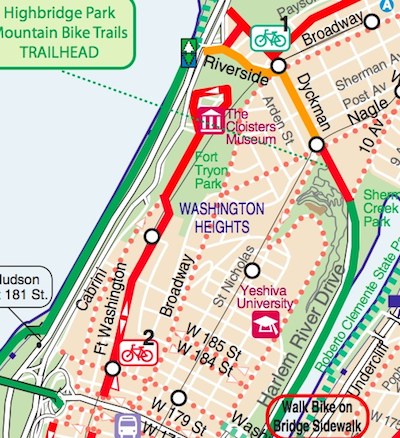
Build bike lanes? Manhattan's Community Board 12 doesn't even want to talk about bike lanes.
When members of the Inwood-Washington Heights Livable Streets Group showed up with local bike lane supporters to what was supposed to be a public hearing on the issue Monday night, the transportation committee chair informed them that there wasn't any space on the agenda for the group to make their presentation, much less hear public testimony, according to a report on DNAInfo. That public hearing has now been pushed forward indefinitely.
The procedural controversy stems from a petition started by the Livable Streets group to improve the bike infrastructure of Upper Manhattan. They're asking for designs like a protected lane along Dyckman Street, connecting the greenways on the west and east sides of Manhattan, and bike lanes over the area's bridges. You can add your name to the current 826 signatories here.
The livable streets activists were first invited to present their petition to the community board last month. "It was a long discussion that first time, and a very hostile reaction," recalled Brad Conover. Three of the four members of the Transportation Committee in attendance came out against bike infrastructure, arguing that cyclists don't deserve new lanes because they don't follow the rules of the road, and that any lane that took away parking was a non-starter.
At that point, the Community Board decided that it needed to hear from the community, said Conover, and scheduled a public hearing on the issue for this past Monday, November 1. That was confirmed by DNAinfo as recently as last week.
Cycling in Upper Manhattan never was discussed on Monday, however. When Conover and other activists showed up, they asked to make a ten-minute PowerPoint presentation explaining their proposal. The committee said there wasn't time, setting off a lengthy argument over whether or not to allow the presentation. "At the end of half an hour, they said no," said Conover.
The public never got a chance to speak either. It was a "miscommunication" that there would be a public hearing on Monday, said the committee; rather, there would only be a discussion of when to hold a public hearing.
Conover said that he thinks the public hearing was cancelled because the anti-bike lane members of the committee felt outnumbered. "The fear in the room was palpable," he said. "They keep adjourning and delaying until somebody shows up who will speak in opposition."
The public hearing may take place at November's meeting of the full community board, or may be put off until the January transportation committee meeting, said Conover.





